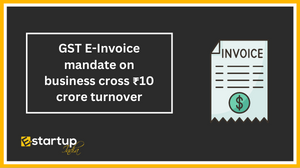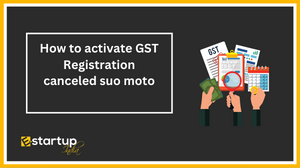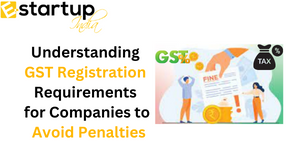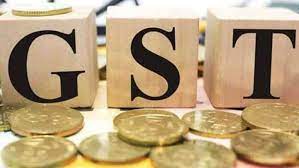GST E-Invoice mandate on business cross ₹10 crore turnover.
This is important for GST-registered businesses. Recently, the government announced an update to the E-Invoice rules. This update will be a significant one under the GST regime. It will also cover more businesses. Let's learn more about the GST E-Invoice mandate for businesses with a turnover exceeding Rs  10 crore.
10 crore.
What is an E-Invoice?
E-Invoice, also known as Electronic Invoice, is a system that's used for B2B purposes under the GST Regime. It's used to authenticate invoices via digital mode on the official GST Portal.
After the E-Invoices have been authenticated online, an unique Invoice Reference number (IRN), is generated by IRP for each invoice.
Every E-Invoice has a QR code and is digitally signed. E-Invoicing allows for the transfer of information directly to the e-way bill portal. You can find out more about E-Invoice under the GST Regime .
Last Update: GST E Invoice Mandate for Businesses with a Revenue Above Rs 10 Crore
According to the notification E-invoicing will become mandatory for all companies with a turnover greater than 10 million rupees. Companies with a turnover exceeding 20 million are required to use electronic invoices.
It clearly states that "In exercise of sub-rule 4 of rule 48 of Central Goods and Service Tax Rules, 2017, The Government, upon the recommendations of Council, hereby makes this further amendment to the notification of Government of India in Ministry of Finance (Department of Revenue), Nr. 13/2020-Central Tax, published in Gazette of India Extraordinary, Part II Section 3, Sub-section i, vide number G.S.R. 196(E), dated 21 March 2020. Specifically:- The said notification states that the "twenty million rupees" words shall be replaced by the "ten crore rupees" words in the first paragraph. This is effective as of the 1st day October 2022.
If your company has more than 10 crore rupees in annual turnover, you will need to generate E-Invoices beginning 1 October 2022. You will not be eligible for Input Tax Credit if you do not.
How can electronic invoicing prevent tax fraud?
E-invoicing offers many benefits, including the ability to prevent tax evasion. An electronic invoice can be amended only if it is not modified after a transaction has been completed. An electronic invoice also gives authorities instant access to all transactions. E-invoicing reduces fraudulent GST invoices by automating and ensuring that the input tax credit is claimed on real GST invoices. GSTN is able to easily track down anyone who attempts to claim bogus tax credits.
How do I easily generate E-Invoices?
Instabill is the best way to generate E-Invoices. Instabill offers the best e-invoicing solutions for businesses.
Additionally, the Instabill Mobile App uses an automated format that conforms to the GST-Invoicing format. All you need to do is enter the information as per the sale. You can also modify the invoice format to suit your needs.
Contact our GST experts at 888-169-069. If you have further questions about Instabill or E-invoicing, please call 888-69-069.
GST on online gaming, casinos and horse racing to be 28% or higher
Indian Finance ministers from the state have asked that the goods and service tax (GST) be raised by 10%, to an highest rate, which is 28% which is expected to harm the country's growing online gaming business. This article will provide you with information on the most recent developments regarding GST regarding Online Gaming. Recent Survey on GST regarding Online Gaming According to an online survey conducted by Local Circles more than 80 percent of people would like the GST rate on online gaming casinos, horses to rise to at minimum 28 percent. Gaming establishments like racetracks, casinos, and casinos on the internet, are now paying GST of 18. In addition, 7 percent of those polled favored the tax rate of 40%, whereas 27% favored an increase of 50 percent. Only 1 percent of those polled believed that gambling on the internet casinos, gaming at casinos, or horse races should not be exempt from GST While 6 percent of respondents were undecided on the issue. The total number of respondents was 12,097. responded to this question in the survey. Govt. on increasing GST Rates for Gaming on the Internet Gaming A ministerial-wide GST Council, chaired by Meghalaya chief minister Conrad Sangma, has voted to recommend an increase in the GST rate for racetrack, casino and online gaming to 28 percent. The GST council must however be able to give its final approval prior to when this is put into effect. Based on the face value or "bet amount" the ministers' panel has decided that tax will be imposed and not the total transaction value. The gambling companies get a share of the transaction's total value, which is comprised of winnings or commissions net (revenues). Many suggestions of this kind have been sent several suggestions like this to GST council for review and approval. What is the reason why this GST regarding Online Gaming Important? Gaming law is more focused on how legal online gaming is since increasing numbers of fantasy gaming mobile applications and websites have become prominent players in the sports and online gaming entertainment industry. A crucial aspect to determine whether fantasy online games are legal is whether they're primarily "games that require skill" as opposed to "gambles." Due to the absence of a standard gaming regulation and the lack of a common gaming regulation, courts have tried various ways to regulate online gambling. As of now, notifications have been issued to various players in the industry by GST authorities in order to recover additional GST due to the dispute over the value. Therefore, making sure that an appropriate GST Regulations and Regulations for GST registration will ensure consistency in the application of the law across all states.
How to activate GST Registration canceled suo moto?
You can cancel your GST Registration either by tax authorities suo Moto or voluntarily. Suo Moto cancellation is the name given to your GST Registration if it is cancelled by tax authorities. This article will show you how to activate GST Registration Canceled by Suo Moto.
What is Suo Moto Cancellation for GST Registration?
Suo Moto Cancellation GST Registration means that the taxpayers won't be GST Registered. His or her GST Registration Certificate will be null. GSTIN or GST Registration Number will also be inoperative.
What happens if Suo Moto Cancellation is Impeached for GST Registration?
-
Taxpayers are no longer eligible to receive the GST Registration benefits.
-
The taxpayers cannot claim Input Credit Credit or pay GST.
-
Businesses that are required to register for GST will face severe penalties if they do not have an active GST registration.
Learn more about the benefits of GST registration at: What is the benefit to applying for the GST number in India
Suo Moto Cancellation for GST Registration in Certain Situations
-
Taxpayer other than taxpayer with Composition Schem under GST Registration, who hasn't filed GST Return Filing for a continuous period of six month
-
Intention to avoid taxes, provides any item or service without an invoice.
-
Invoices or bills issued without providing services or goods, in violation of the GST Act and the rules thereunder. This could result in a wrong use of the input credit or tax refund
-
Any amount that represents the tax but is not paid in the Central/State Government bank account within three months of the due date
-
Failure to pay any interest, tax, or penalty due the Central/State Government for a period beyond three months starting from the date such payment is due
-
As per the GST Law, a person is no longer entitled to tax deductions at source.
-
The GST Law makes it clear that a person is not liable to collect tax at source.
-
A person does not need to register under the GST Law.
-
GST Practitioners are guilty of any conduct related to any matter that is in compliance with the GST Law.
-
Discontinuation/Closure of Business
-
A change in the Constitution can lead to changes in PAN
-
Ceased to be responsible for GST
-
In the event of merger/mergers, amalgamation, leasing or sale, the business may be transferred.
-
In the case of a business with Sole Proprietorship Register, death of sole proprietor
-
Composition Scheme A registered taxpayer has not filed returns for the three previous tax periods.
-
Registering was done fraudulently, by intentional misstatement or suppression of information.
Step-by-step Procedure to activate GST Registration Cancelled suo moto
-
Visit the GST Portal.
-
Use your Credentials to access the portal
-
Select services from the Dashboard. Click on Services and then select Registration. Then, choose Application for Revocation of Cancelled Registration.
-
Add the reason for the revocation to the form and attach any supporting documents. If your GST Registration was cancelled due to non-compliance, you can also complete the GST Return Filing procedure.
-
After signing the Digital Signatory Certificate, or EVC, select the authorized signatory.
If you have any questions, feel free to call our experts at 888-169-069
If the appropriate officer is satisfied that the taxpayer has provided sufficient justification to reverse the cancellation, the officer will cancel the cancellation.
It will be done by the competent officer within 30 days of the date of the application to cancel the registration. The order must be signed by the competent official in FORM GSTREG-22 to reverse the cancellation.
Revocation Period Time Limit
Any registered tax payer may request the cancellation of their GST registration within 30 days. Revocation requests can only be made when the relevant authority has cancelled the registration. Revocation is not possible if a taxpayer cancels their GST registration.
GST Registration for Branch Offices.
If your company has numerous locations, it's critical to understand the GST registration requirements for each one. This guide will walk you through the process of registering for GST for your branches and the advantages of doing so. 
Step 1: Decide if each branch requires GST registration.
For GST registration reasons, each company location is treated as a separate entity under the GST regime. This implies that if you have multiple branches in different states, each one may require its own GST registration.
However, if all of your branches are in the same state and have the same PAN, you may be able to acquire a single GST registration for all of them. You can contact a GST expert or refer to the GST laws and regulations to determine whether each of your branches requires a separate GST registration.
Step 2: Gather the Necessary Papers.
After determining which branches require GST registration, the next stage is to gather the necessary documents. The paperwork required for GST registration varies based on the type of company and the state in which the branch is located.
The following documents are typically needed for GST registration:
- The corporate entity's PAN card
- Evidence of company registration (such as the Certificate of Incorporation, Partnership Deed, or LLP Agreement)
- Proof of the authorised signatory's identity and location
- Proof of company location (such as the rental agreement or electricity bill)
- Account information
Step 3: Fill out the Tax Registration Form.
You can apply for GST registration online through the GST portal once you have all of the necessary documents. The registration procedure is fairly simple, but it is critical that all information provided is accurate and up to date.
Following the submission of your application, you will be sent an Application Reference Number (ARN) to your registered email address and cell phone number. The ARN can be used to monitor the status of your application.
Step 4: Get your GST Registration Document.
You will receive the GST Registration Certificate for each of your branches once your application is accepted. The certificate includes essential information such as the GSTIN (Goods and Services Tax Identification Number) and the registration's effective date.
The Advantages of Getting a GST Registration for Subsidiaries
Obtaining a GST registration for each of your locations can provide a number of advantages, including:
- Observance of GST rules and regulations
- Possibility of claiming an input tax credit for GST paid on transactions
- Customers' ability to receive GST-compliant bills
- Access to different GST benefits and programmes
Conclusion
Finally, obtaining a GST registration for each of your branches is a critical move towards complying with GST laws and regulations. By following the steps outlined above and collecting the necessary documentation, you can obtain a GST registration for your branches and reap the benefits that come with it.
Understanding GST Registration Requirements for Companies to Avoid Penalties
In India, the Goods and Services Tax (GST) regime has significantly altered the taxation structure. For companies that fit certain requirements, GST registration is required. Penalties and fines may be assessed for failure to apply for GST. We'll go over the GST registration requirements for companies in India in this article to help you avoid fines.
Business GST Registration Rules
1-Transparency Level:
Businesses must register for GST if their yearly revenue exceeds Rs. 20 lakhs (Rs. 10 lakhs in North-Eastern and Hill states). Based on the total annual revenue of the company, which includes both taxable and non-taxable supplies, the GST registration threshold is determined.
2-Materials from Other States:
Regardless of their annual turnover, companies that provide products and services between states must register for GST. The transfer of goods or services from one jurisdiction to another is referred to as an interstate supply.
3-Managers in E-Commerce:
Regardless of their annual revenue, e-commerce operators must apply for GST. Businesses that enable the supply of products or services through an electronic platform are referred to as e-commerce operators.
4-Distribution Services for Data:
ISDs, or input service distributors, must apply for GST. Businesses known as ISDs are those that acquire input services and offer them to their locations.
5-Informal Taxable Individuals:
Casual taxpaying individuals must apply for GST. Businesses without a permanent location of business but that occasionally or temporarily provide goods or services in taxable territory are referred to as casual taxable persons.
6-Taxable Non-Resident Individuals:
Taxable individuals who are not residents must apply for GST. Businesses that provide products or services in India but don't have a permanent place of business there are referred to as non-resident taxable persons.
7-Sanctions for Failure to Comply:
Penalties and fines may apply if you don't file for GST. The fine for failing to register for GST is equivalent to the greater of 10% of the tax liability or Rs. 10,000. Additionally, companies that don't register for GST aren't permitted to charge GST to their clients, which can lead to a loss of income.
Conclusion:
In conclusion, businesses in India that satisfy certain requirements must register for GST. If a company's yearly revenue exceeds Rs. 20 lakhs (Rs. 10 lakhs for the North-Eastern and Hill states) or if it engages in interstate supplies, e-commerce activities, ISDs, casual taxable persons, or non-resident taxable persons, it must register for GST. Penalties and fines may apply if you don't file for GST. Businesses can avoid fines and abide by the GST rules and regulations in India by comprehending the requirements for
GST registration and following the registration processes.
When Gst registration is compulsory. Call us: 8881-069-069|E-Startup India
Gst Registration is Compulsory For All those service providers whose annual turnover exceeds ₹20 lakh in a financial year are required to register for the GST as a normal taxable entity. For the special category states i.e. Jammu and Kashmir, Himachal Pradesh, Uttarakhand and North eastern states, the annual turnover limit is ₹10 lakh.But Some Cases Gst Registration is not Compulsory persons who are engaged exclusively in the business of supplying goods or services or both that are not liable to tax or wholly exempt from tax or an agriculturist, to the extent of supply of produce out of cultivation of land are not liable to register under GST.
Gst Registration is compulsory For All Types Of business Like Food,Business firm,Buy or Sell business And Medical,etc.
GST invoice is an essential requirement for every business. It is very much needed to ask customers to make payment of delivered product and service, as well as tax invoice, allow the buyer to claim the Input tax credit.
However, many businessmen still don't know the complete elements of GST invoicing and what is the right time to raise tax invoice. Here's the interactive video that will guide you all about GST invoicing.
Sign up free at www.instabill.co for creating tax invoice easily.
Download the Instabill Mobile App from here.
Only GST registered businesses having GSTIN can charge GST on an invoice and issue tax invoice. If you don't have GSTIN apply here for GST registration.
Know more about complete GST return filing procedure.
Download E-Startup mobile App to keep updated with the latest business news and get an advance reminder for business compliance –
The 33rd GST council meeting has introduced a reduction in GST rates in housing sector buyers and builders.
The International Organization for Standardization or ISO describes the set of standards for perfect Quality Management System on the basis of the process model. ISO certification is moreover a fundamental requirement before carrying out business with a global trader. An ISO certification makes you eligible to enter into the global markets. Apart from that, ISO certification helps the business entity in getting eligible for government tenders as well as all private & public contracts. This also helps in increasing the business.
ISO CERTIFICATION is very necessary today. Almost all types of businesses do have need of ISO CERTIFICATION for greater progress.
There's no doubt an ISO certification logo must be used on a product to highlight its quality factor.
An ISO mark can really help in authenticating the quality factor in a business. On seeing the ISO certification logo, you can easily confirm the authenticity of ISO standards and also know about its legality. This can further build consumer trust.
Thus you need an ISO certification for the higher growth and business expansion. So what are you looking for? Know everything on ISO CERTIFICATION through the complete guide!
FSSAI registration
It is necessary to get an FSSAI Registration when you are dealing in a food business operation. A food business operator requires a basic FSSAI Registration if his annual turnover is up to ₹12 lakh or in case you deal in food products as a supplier or a manufacturer. It will not only help you in getting your food business acknowledged but also assure your business clients of food safety.

On the basis of the type of activity, FSSAI registration is compulsory for-
- A food vendor who makes or sells any food items as a small trader, hawker, stallholder or a small shopkeeper.
- Distributor of food products or religious Prasads, seasonal occasions (this will exclude caterers)
- Food manufacturer or processor whose production capacity is up to 100 l/kg per day
- Diary product supplier, whose extraction, storage capacity is up to 500 l/day
- Poultry suppliers whose slaughtering capacity is 2 big animals, 10 small animals and 50 poultry birds (i.e. chicken, ducks, turkey etc.) in a day.
- Petty food businesses such as restaurants, Dhabas, canteens/mess, transporters etc. with turnover up to ₹12 lakh.
All you have to do is-
- Upload the necessary documents & details on the web portal,
- Select the package and payment options.
- Your FSSAI Registration Application will be filed over the web and your FSSAI Registration will be done swiftly in just a couple of days.
Know more in detail about the FSSAI registration through a comprehensive guide on FSSAI registration.
